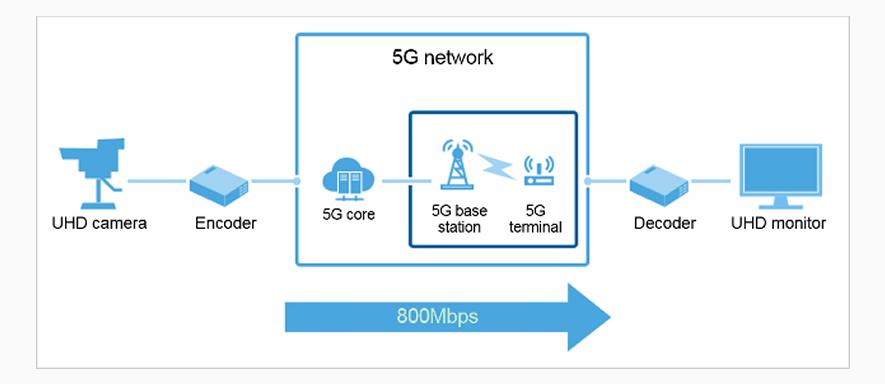Japan’s SoftBank and Huawei Technologies Japan teamed up to demonstrate various potential use cases for a 5G network to SoftBank’s business partners. The use cases included ultra-high throughput, ultra-low latency transmission, and edge computing.
The demonstration included real-time UHD video transmission using ultra-high throughput, remote control of a robotic arm using ultra-low latency transmission, and remote rendering via a GPU server using edge computing. The real-time UHD video transmission demonstrated throughput of over 800 Mbps. Also, the remote control of the robotic arm demonstrated an ultra-low latency one-way transmission of less than 2ms.
SoftBank is planning various experiments to study 5G technologies and is endeavoring to launch 5G commercial services around 2020.
Real-time UHD video transmission
For the real-time UHD video transmission demonstration, a UHD camera was installed inside the demonstration room to capture outdoor scenery. The data from this camera was then compressed in real-time using an encoder and transmitted through the ultra-high throughput 5G network to a UHD monitor via a decoder, where the original data was recovered.
In this demonstration, the scenery of the Odaiba Tokyo Bay area was successfully displayed on the UHD monitor using the ultra-high throughput provided by the 5G network. This technology can be applied to various industries, including tele-health or tele-education.
Immersive video
In the immersive video demonstration, scenery was captured by a 180-degree camera equipped with four lenses pointing four different directions installed in the demonstration room, and captured scenery was distributed to smartphones and tablets over the 5G network.
Four separate cameras were set up to capture the scenery in different directions, and the video images captured by these cameras were stitched together to generate a 180-degree panoramic video image that enabled multiple simultaneous camera views.
Then the video image was compressed and distributed to smartphones or tablets in real-time over the 5G network, which gives users a truly realistic user experience. Coupled with a 5G network, this technology can be applied to virtual reality (VR) or augmented reality (AR).
Remote control of robotic arm with ultra-low latency
For the remote control of robotic arm with ultra-low latency demonstration, a robotic arm played an air hockey game against a human in this demonstration. A camera installed on top of the air hockey table detected the puck's position to calculate its trajectory.
The calculated result was then forwarded to the robotic arm control server to control the robotic arm. In this demonstration, the robotic arm was able to strike back the puck shot by the human player on various trajectories. This technology can be applied to factory automation, for example.
Remote rendering by GPU server
Remote rendering by GPU server was also demonstrated. Rendering is a technology used to generate videos or images using computers with GPUs (Graphic Processor Unit). This technology is used for generating HD videos in computer games or for CAD (Computer Aided Design).
The rendering consumes a large amount of computing resources. Therefore, HD computer games or HD CADs were not executable on tablets or smartphones on their own. However, edge computing technology provided by the 5G network allows us to enjoy HD computer games or HD CADs on tablets or smartphones.
A GPU server located near a 5G base station performed rendering and the image generated by the GPU server was sent to the tablet over the ultra-high throughput and ultra-low latency 5G network. This technology can be applied to check the CAD data at a construction site with a tablet or to enjoy an HD game application on a smartphone.





